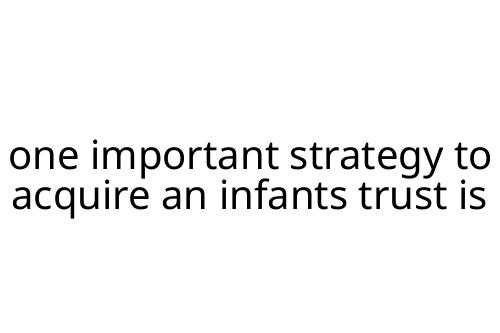one important strategy to acquire an infants trust is
When you’re caring for a baby, trust is at the heart of the relationship. It’s the foundation for healthy emotional development. So, one important strategy to acquire an infant’s trust is consistent, responsive caregiving. That means not just feeding or changing a baby on schedule, but tuning in to their needs with reliability and warmth.
Let’s break down how this approach works, why it matters, and how to put it into practice.
What Is Consistent, Responsive Caregiving?
Responsive caregiving starts with watching for a baby’s cues: crying, cooing, reaching, or turning away. It’s about recognizing these signals quickly and responding in a way that fits the situation. If a baby cries, a responsive caregiver offers comfort without delay. If they laugh, you reflect their joy. The consistency part comes in doing this reliably, day after day.
This doesn’t mean perfection. All parents get tired or busy. But over time, babies learn to expect that someone will come when they cry, meet their needs, and provide comfort. That expectation is trust being built.
Why Does Trust Matter in Infancy?
In the first year, infants are completely dependent and extremely sensitive to their environment. The feeling of safety and security—knowing someone will meet their needs—helps develop their ability to form healthy relationships later on. This is the basis of attachment theory, a well-supported idea in developmental psychology.
Infants who experience consistent, caring responses to their needs generally grow more confident, social, and resilient. On the flip side, an inconsistent or unresponsive environment can make a baby more anxious or withdrawn.
Practical Ways to Build Trust
Start by making daily routines predictable. Feedings, naps, and playtime don’t have to happen at the exact same time every day, but some predictability helps a baby feel secure.
Watch for what your baby is trying to communicate—every baby has different signals. When your baby seems restless, try to find out if they’re hungry, tired, or want a change of scenery. Respond promptly, even if you’re not always sure what they need. Your effort and presence matter more than perfection.
Even small moments count. Make eye contact. Smile when you can. Use a soothing voice during diaper changes or bath time. This kind of regular, positive interaction builds trust and helps your infant associate you with comfort and safety.
Pros and Cons
Consistent, responsive caregiving is rewarding but can also be demanding. It often requires putting aside your own needs for a while, especially at the start. Fatigue and frustration are normal. But the benefits—a strong bond, a more secure and happy child—are generally worth it.
Final Thoughts
Ultimately, one important strategy to acquire an infant’s trust is showing up again and again in caring, reliable ways. You don’t have to be perfect. Just be present and responsive as often as you can. In doing so, you’ll lay the groundwork for a healthy, trusting relationship that will guide your child’s emotional development for years to come.

 Kelly Osborne was instrumental in building Hype Gamble Match, utilizing her background in digital marketing and content strategy to create a seamless user experience. Kelly’s work in crafting engaging content and optimizing the site’s reach to a wider audience has made the platform accessible to both newcomers and experienced bettors. Her efforts have ensured that the platform’s insights and expert tips reach a diverse and growing user base, enhancing Hype Gamble Match’s reputation in the betting industry.
Kelly Osborne was instrumental in building Hype Gamble Match, utilizing her background in digital marketing and content strategy to create a seamless user experience. Kelly’s work in crafting engaging content and optimizing the site’s reach to a wider audience has made the platform accessible to both newcomers and experienced bettors. Her efforts have ensured that the platform’s insights and expert tips reach a diverse and growing user base, enhancing Hype Gamble Match’s reputation in the betting industry.